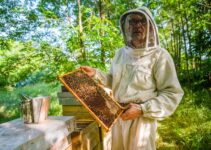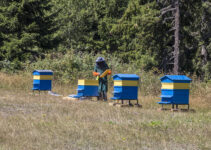Arizona is home to a vast number of diverse bee species, both solitary and social bees. The farming of bees must be carefully monitored and controlled to protect the environment. While there are no laws in Arizona preventing people from keeping bees, there are laws that control how bees must be kept to protect the local bee population.
Arizona state has some basic laws and rules for beekeeping which are monitored and enforced by the state Apiarist or Beekeeping Inspector. Inspections and certifications are required for transporting bees across state lines. Local municipalities have additional beekeeping regulations.
Beekeeping laws are not meant to be restrictive for beekeepers but rather a measure to protect the local environment and people in urban and suburban areas. Arizona beekeeping laws are not different, and it is the responsibility of each beekeeper to ensure they are following the local laws.
What Are the Laws For Keeping Bees in Arizona?
Arizona in the southwestern US has a desert-type climate with hot summer temperatures and mild winters. This generalization of the state’s climate can be deceiving due to the vast size of Arizona.
Many areas of Arizona have localized climate conditions that differ from the generalized average. As a result, many areas of Arizona are suitable for raising bees, and the mild winters allow the bees to be productive for a longer portion of the year.
Vegetable growing is a large part of Arizona’s agricultural sector, offering many opportunities for beekeepers in the pollination service industry.
Arizona has more than 1300 different species of wild bees, which must be protected to ensure their forage is maintained and they are not out-competed for resources by farmed bees.
Laws are required to protect natural species from agricultural species and non-indigenous invader bee species.
Killer Bees A Risk For Arizona
Much of the killer bee’s reputation is blown out of proportion by the movie industry and the media, but there is no doubt that this hybrid bee species is a problem for Arizona and the beekeepers in the state.
Legal intervention in the form of regulating the beekeeping industry is one means in the strategy to prevent the increased population of killer bee colonies in Arizona.
The only sure way to tell if a bee colony is Africanized is to perform genetic testing on the bees in the colony.
A colony that displays aggressive behavior is not necessarily Africanized, but beekeepers with aggressive colonies are encouraged to re-queen the colony with a queen of known genetic origin.
Laws For Moving Bees In Or Out Of Arizona
Arizona has an appointed State Apiary Inspector, whose primary function is to inspect, certify, and enforce the beekeeping laws of the state.
All bees and beehives shipped into or out of the state of Arizona must be accompanied by a certificate of inspection that verifies that the office of the State Apiarist has inspected the colony.
The inspection is to control the influx of American Foul Brood, European Foul Brood, and other contagious and parasitic bee diseases or pests.
The action to be taken regarding infected colonies will be prescribed by the designated official, whether quarantine and treatment will be effective, or if the colony must be destroyed.
The shipment of secondhand beekeeping equipment into the state of Arizona is prohibited unless the State Apiarist has inspected it.
General Rules For All Beekeepers In Arizona
Arizona has several rules that all beekeepers must comply with as a basic standard for beekeeping in the state
- All bee hives must have removable frames. All bees must be kept in hive designs that accommodate the easy removal of frames for the purpose of inspection. Keeping bees in any other hive design without frames is prohibited.
- The bee hive location must be accessible. The location where the bees are kept must be accessible for inspection. Keeping bees in houses or other locations that are not easily accessible by authorized inspectors is prohibited.
- Bees not kept in appropriate locations or hives may be destroyed. The state apiary inspector’s office will give the beekeeper written notice to make a bee hive available for inspection within a certain time frame. Failure to comply with the request may lead to an order to destroy the colony.
- The beekeeper must assist the apiary inspector. The beekeeper is responsible for providing any state-appointed inspector with the necessary assistance regarding access to apiaries, handling beehives, and any other help that will assist the inspector in getting the job done.
Localized Beekeeping Laws In Arizona
Each county or municipality in Arizona can impose additional legislation regarding keeping bees in their jurisdiction.
Each area has its own regulations and bylaws that a beekeeper must investigate and comply with before keeping bees within the region’s boundaries.
The specific regulations regarding beekeeping vary from place to place, which requires the beekeeper to enquire with the local authorities in their region what the local law stipulates.
Some examples of beekeeping regulations in Arizona include the following.
Tempe, Arizona Beeleeking Laws
In Tempe, the law states that any beehive that becomes a public nuisance or poses a threat to the public must be removed.
The other regulations for Tempe beekeepers are as follows.
- Occupied beehives must be a minimum of 200 feet from a neighbor’s dwelling.
- A beehive must not be placed within 50 feet of a property line.
- Beehives must be at least 150 feet from a street or pathway.
- Apiaries must have a permit.
Queen Creek, Arizona Beekeeping Laws
Queen Creek is one of the few regions in Arizona that require beekeepers to register and pay an annual fee to keep bees.
In addition to the Arizona state beekeeping laws, Queen Creek includes the following regulations in its legislation.
- Beekeepers keeping bees within the town limits must have a beekeeping license. The fees are $10 per apiary site per year.
- All occupied beehives must be clearly marked with the beekeeper’s license number.
- Beekeepers must provide an adequate water source for their bees within 30 feet of the beehive or apiary.
- Beehives must not be located within 30 feet of any exterior property line in residential areas.
- Keeping bees in any manner that presents a public hazard is prohibited.
Beekeeping Associations In Arizona
Beekeeping associations are a good way for beekeepers to become familiar with local laws and best beekeeping practices for their local region.
Arizona has several beekeeping associations that you can choose from, but the best option is to join a beekeeping association close to where you live. You will be able to attend meetings and practical workshops and interact with the local beekeeping community.
| Beekeeping Association | Region | Contact |
| Southern Arizona Beekeeping Association | Cochise, Pima, Santa Cruz | https://southernazbeekeepers.org/ |
| Central Arizona Beekeepers Association | Phoenix, East Valley Area, West Valley Area | https://www.azbeekeepers.org/ |
| Northern Arizona Organic Beekeepers Association | Sedona | NAOBA Facebook Page |
Conclusion
Arizona is a large state with varying climatic conditions, making many regions good for beekeeping. The beekeeping laws in Arizona are not particularly onerous, but each local county and municipality have different regulations that apply to beekeeping within their boundaries.
Check with your local municipality or beekeepers’ association to determine the specific legal requirements for keeping bees in your area of Arizona.
References
https://www.pollinator.org/pollinator.org/assets/generalFiles/AZ_bee_guide_FINAL.pdf
https://www.facebook.com/northern.arizona.organic.beekeepers.association/




